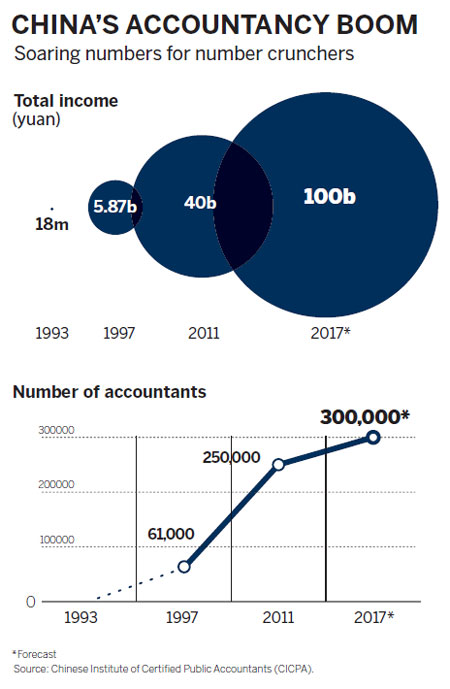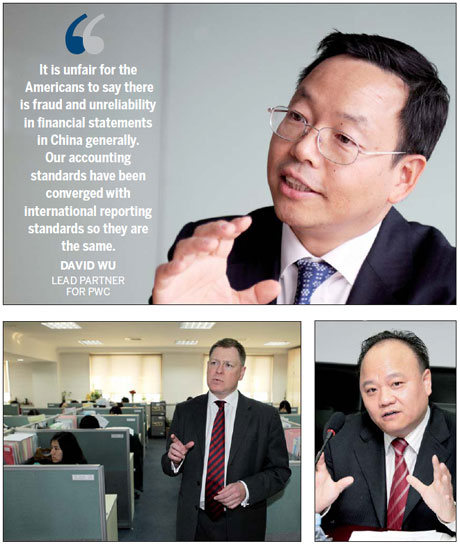Held to account
Updated: 2012-03-16 08:45
By Andrew Moody and Li Aoxue (China Daily)
|
||||||||
|
Russell Brown, managing partner of Lehman Brown; and Zhu Jiandi, managing partner of BDO China Shu Lun Pan. Liu Zhe / China Daily Feng Yongbin / China Daily Provided to China Daily |
Brown, who is from the UK and a former global financial officer of public relations giant Shandwick (now Weber Shandwick), says problems surrounding financial information in China are often exaggerated.
He set up practice in 2001 because he thought there was a gap in the market for those wanting to do business in China. His company now has six offices throughout China and 200 employees, the majority of whom are Chinese.
"Where there are things that are unsupported, any investor needs to make a decision whether to take them out of the equation or take into account a risk factor and adjust the price," he says.
"The risk factor is more in the legal side. It is more difficult to take legal action in China than it would be in somewhere like the UK."
The Big Four firms, which apart from PwC and Deloitte comprise Ernst & Young and KPMG, still dominate the China market.
Currently, all four operate under joint venture arrangements with Chinese firms but this is about to change.
 |
As part of the process of these firms' 20-year licenses to operate in China expiring, the Chinese Ministry of Finance wants them to adopt limited liability partnerships.
Such a new arrangement will make individual partners liable for their actions in China and as a result they can be sued for their own private assets.
At present, only the legal entity in China is liable and accountancy firms typically have little in the way of assets - office leases, desks and computers - since their main capital is human.
As part of the reform, the government wants anyone signing off audit work to have the Chinese CICPA qualifications, even though the fail rate for the exams is around 30 percent.
The licenses of KPMG Huazhen and Ernst & Young Hua Ming expire this year, that of Deloitte Touche Tohmatsu next year and PwC's unique 25-year license in 2018.
Wu at PwC believes the reform will bring greater discipline to the China audit market.
"The new model will be a big discipline and put big pressure on those signing off accounts and carrying out due diligence to fulfill their responsibilities," he says.
He says the firm has not yet decided whether to apply for a new license before 2018.
"We are studying it and consider whether we will convert earlier," he adds.
It used to be the case that when a Chinese company was considering an IPO or a takeover of an international business it would require the services of one of the top international firms because of the strength and depth of their in-house expertise.
But the competency level of China's top homegrown firms is ever increasing and many are now able to offer their skills to Chinese companies doing business in overseas markets and also to foreign companies wanting to access the Chinese market.
James Lee, regional director for the Institute of Chartered Accountants in England and Wales (ICAEW), based in his offices at Oriental Plaza, one of China's glitziest retail and commercial complexes in the Wangfujing shopping district of Beijing, says this capability has been enhanced by a number of firms joining global networks.
"By joining an international group, Chinese domestic accounting firms can learn and share information and knowledge with these international groups, and this has enhanced their capability to perform on the global stage," he says.
One such company that has benefited from being part of a global network is BDO China Shu Lun Pan, based in Shanghai and which has 26 branch firms around China. It is part of the BDO global financial network, the fifth largest in the world.
It is involved in a large number of IPOs and its revenue has reached 1 billion yuan. The smallest of the Big Four, KPMG Huazhen, had a revenue of 1.86 billion yuan in 2010, according to CICPA figures.
"The gap between the Big Four and the domestic accounting firms is narrowing," says Zhu Jiandi, managing partner of BDO China Shu Lun Pan.
"The rapid development of the IPO market as well as the Shenzhen SME Board and the Hong Kong Growth Enterprise Market (GEM), have brought enormous opportunities to domestic accounting firms."
Zhang Lianqi, partner at Zhongrui Yuehua, based in Beijing and itself part of the RSM global financial network, says the main problem is the brand image for some Chinese accounting firms.
"It is sometimes difficult for us to compare ourselves with them because of this brand effect they have," he says.
He says, however, his company is set to announce a merger later this month with another top-10 Chinese accountancy firm Guofu Haohua, part of the US Crowe Horwatch network, which would make it bigger than two of the current Big Four in China.
"We really don't see any big difference between us. We follow the same standards. Many of our partners and those of other Chinese domestic accounting firms have worked for the Big Four."
There are pressures in the system, however, and, in particular the intense competition that now exists between many accountancy firms.
Pan Fei, a professor in accountancy at the Shanghai University of Finance and Economics, says this can sometimes lead to some firms overstepping the line.
"The competition between accounting firms in China has become quite fierce. If an accounting firm is worried about losing clients, they may provide a favorable report that is in accordance with their client's requirements. This might be particularly the case if a client wants to go public and list," he says.
For those who have had experience of working in overseas markets, one of the main idiosyncrasies of the accounting process in China is the way the tax system operates. In China, companies are not allowed to write off bad debts against their tax bill so they pay tax even on unpaid invoices.
Brown at LehmanBrown says this is one of a number of such anomalies between China's and other tax jurisdictions.
"The tax system is so out of sync with the normal accounting system," he says.
"If they (the government) want to enforce more transparent accounting and (for the profession) to follow new rules that are in line with international standards, they really need to adjust the tax system and bring it up to date," he says.
"The tax books are normally prepared with full supporting information because that is what the tax bureau wants. With management accounts there can be adjustments that need to be verified and that is where there can be issues," he says.
Pan Fei in Shanghai says it is difficult to achieve standardization even by adopting common standards.
"Accountancy everywhere in the world has a certain flexible character. Although standards may be fixed, there will still be a different outcome, even if two different accounts follow the same standards," he says.
While the profession may have advanced in China over the past 20 years, whether it has kept pace with developments in the West is still open to question.
Accountants are now required to do much more than audit sets of financial accounts but also analyze risk areas in businesses as well as come up with creative solutions to problems.
"The general level of knowledge in the profession in China is quite good," adds Brown at LehmanBrown.
"However, what is not quite yet there - although it is improving over time - is greater interpretation of business situations and 'out of the box' thinking."
James Lee at the ICAEW, however, says people too easily forget that the accountancy profession in China is in its relative infancy.
"The accountancy profession in China is still a young profession. It will take time for it to grow and become more experienced."

 Relief reaches isolated village
Relief reaches isolated village
 Rainfall poses new threats to quake-hit region
Rainfall poses new threats to quake-hit region
 Funerals begin for Boston bombing victims
Funerals begin for Boston bombing victims
 Quake takeaway from China's Air Force
Quake takeaway from China's Air Force
 Obama celebrates young inventors at science fair
Obama celebrates young inventors at science fair
 Earth Day marked around the world
Earth Day marked around the world
 Volunteer team helping students find sense of normalcy
Volunteer team helping students find sense of normalcy
 Ethnic groups quick to join rescue efforts
Ethnic groups quick to join rescue efforts
Most Viewed
Editor's Picks

|

|

|

|

|

|
Today's Top News
Chinese fleet drives out Japan's boats from Diaoyu
Health new priority for quake zone
Inspired by Guan, more Chinese pick up golf
Russia criticizes US reports on human rights
China, ROK criticize visits to shrine
Sino-US shared interests emphasized
China 'aims to share its dream with world'
Chinese president appoints 5 new ambassadors
US Weekly

|

|








